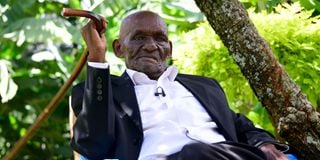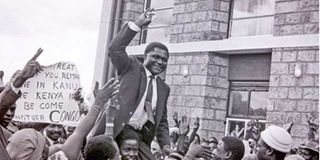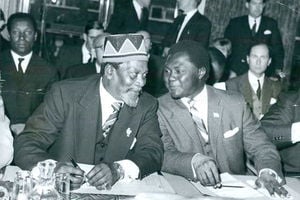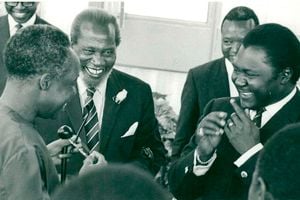
The 92-year-old Ndwiga Muruathika, a self-confessed hitman at his home in Runyenjes, Embu County during the interview.
When we arrived at his home in Runyenjes, Embu County, 92-year-old Ndwiga Kathamba Muruathika alias Ndume, as he is popularly known, had just woken up. Now in his sunset years, he is a man who has seen it all, from Kenya’s struggle for independence to the reigns of five presidents.
After welcoming us to his home, he retreats to the house then calls our fixer Moses Wamuru for a brief engagement. As we wait outside, we set up for the interview. Before long he emerges, dressed in a black suit and white shirt, with his two sisters in tow, then asks again what we want from him. He moves his chair to a different spot in a way that disorganises our set-up.
Ndwiga then drops a bombshell; he was among three Kanu youth wingers who were approached by an individual he would not identify, citing an oath of secrecy, with a mission to kill.
He says they were tasked to trail then Cabinet minister for Economic Planning and National Development Tom Mboya until the day he was shot dead in Nairobi central business district on Saturday, July 5, 1969. Mboya was assassinated as he left a chemist on present-day Moi Avenue near the national archives.
The man whose memory is still sharp despite his advanced age discloses and withholds information almost in equal measure.
He alleges that he is still bound by the oath of secrecy, which he took decades ago and, therefore, cannot reveal much.
But on other hand, he says he doesn’t want to go to the grave with some deep dark secrets that he has kept for 55 years. He claims it’s a burden that has worn him down and he wants to get rid-of.
According to Ndwiga, the three had been brought into the plot to eliminate Mboya six months earlier in January 1969.
The other two were Nahashon Njenga from Kiambu district and Gitonga Gathanju from Nyeri. Ndwiga was the Kanu youth winger representing Embu. Njenga was subsequently convicted of the killing of Mboya and hanged.

Tom Mboya at a political rally. He was shot dead on July 5, 1969 along Nairobi's Government Road (Moi Avenue).
He says they were part of a group that had been taken to Bulgaria for paramilitary training and were personally known to Mboya who was also Kanu secretary general.
Ndwiga alleges the plot to eliminate Mboya was hatched by a powerful clique of high ranking government officials from Kiambu considered very close to the powers that be at the time.
But he declines to name the person(s) who orchestrated the plot behind-the-scenes citing the secrecy that shrouded operations at the time since the country was still smarting from colonialism that had forced many activities to be carried out clandestinely and under oath.
“Unajua umau mau ilikuwa bado ni mingi na hii watu hawakutaka mambo yao itoke nje. Kila kitu ilikuwa unakulishwa kiapo (the mau mau secret mode of operation was still very much alive and those people never wanted their plans to leak, therefore, everything sensitive thing entailed oathing of individuals involved),” says Ndwiga.
He claims when the plot to kill Mboya was concluded, he was approached and given money to purchase three pistols in the black market along Kenya-Somalia boarder. His job was to identify the guns, make payments and then quietly return to Nairobi. Someone else was to smuggle them to Nairobi. The trio would later be handed the guns.
Ndwiga neither discloses the person who facilitated and financed the purchase and delivery of the guns nor how the weapons found their way into the capital city.
He explains the pistols were secured from outside the country to avoid them being traced to the Kenyan government in the event ballistic investigations were conducted.
“Ukisikia mambo kama hiyo ni plan ndefu. Si mtu moja anapanga ni kama revolution. Haiwezi pangwa na mtu mmoja. (These plots are complex and involve a lot of people),” Ndwiga says.
Prior to Mboya’s arrival from Addis Ababa, Ethiopia, where he had been attending a weeklong meeting of Africa’s economic ministers, the three were quickly called to their usual meeting point.
Each was handed their pistol and given instructions to trail and kill the minister. They were informed that he would be in the city centre for a meeting with some officials representing workers since he was a trade unionist. They met at a hotel near tea room to strategise on how to accost Mboya.
On the fateful day, Ndwiga claims his conscience nudged him not to betray Mboya. And he plotted how to back off from the murder plot.
He claims he calculatedly fell behind his two other accomplices as they headed to Moi Avenue where Mboya had visited a chemist.
Ndwiga claims he jumped into a public service vehicle and left for his Embu home. Asked why he took off yet he had been at the centre of the entire plot to kill the minister, he claims a sixth sense told him not to trust the gang he was working with since he was the only outsider being a member of the Embu community.
Influential leaders
It is said at the time, a powerful cabal of influential leaders nicknamed Kiambu mafia had made a declaration that power would never cross River Chania to any other part of the country.
Since the founding President Jomo Kenyatta was ageing and had suffered a stroke earlier, a succession plan needed to be quickly cobbled up to influence his successor.
With Kenya’s first vice president Jaramogi Oginga Odinga already kicked out of Kanu and his successor Joseph Murumbi also out of the way, Mboya was the main threat, hence the Kiambu team had engineered the appointment of Daniel Arap Moi as vice president.
When Ndwiga reached his home in Embu, news about Mboya’s shooting and subsequent death was all over.
Natalia Njura, his younger sister, says their brother never spoke about the matter but his abrupt return to their home surprised everyone.
She says they noticed he never left the compound and later some persons believed to be officers of the Criminal Investigations Department (CID) visited their home often.








